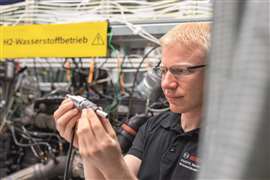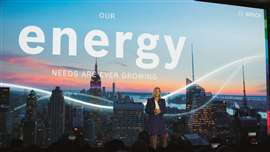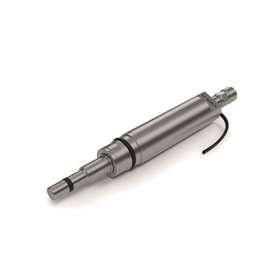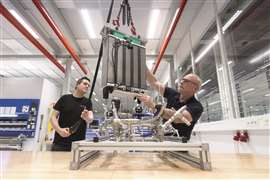Fuel injection must follow the hydrogen
20 March 2024
 Robert Bosch has introduced new injectors for hydrogen internal combustion engines, while planning support for the wider H2 economy. (photo: Bosch)
Robert Bosch has introduced new injectors for hydrogen internal combustion engines, while planning support for the wider H2 economy. (photo: Bosch)
While hydrogen fuel cells require purified fuel and air, high-tech filtration and (preferably) a low-contamination work environment, hydrogen internal combustion (IC) engines are as robust as their diesel or natural gas (LNG/CNG) counterparts.
Using a series of components shared with a standard IC engine, models using H2 fuel can deliver beneficial synergies across both development and manufacturing. For example, every component below the valve head seal can be transferred for use with hydrogen fuel with little or no modification.
In addition, vehicle and machine fleet operators can achieve CO2 neutrality when using green hydrogen fuel.
 Dr Tanja Rückert speaking at CES 2024. (Photo: Bosch)
Dr Tanja Rückert speaking at CES 2024. (Photo: Bosch)
Speaking at CES 2024 in Las Vegas, Dr Tanja Rückert, member of the board at Robert Bosch with responsibility for digital business and service, commented: “To help us meet our global energy needs in a resource-efficient way, Bosch is focusing on digitalization, electrification and hydrogen.”
DI and PFI
Complications with using hydrogen fuel are largely related to injection of the gas into the combustion chamber. As the lightest element in the universe, hydrogen has a tendency to collect at the top of the combustion chamber. This means it is difficult to achieve a balanced air/fuel mix, possibly resulting in uneven burn, unbalanced power delivery and wasted fuel.
To avoid these issues, some OEMs have elected to use indirect injection, where H2 fuel is added to a pre-combustion chamber to help achieve a more thorough fuel burn in the combustion chamber.
But a new direct injection (DI) H2 fuel injector from Robert Bosch has been introduced that can create the required air/fuel mix without the added complication of a pre-combustion chamber.
 Hydrogen direct injector. (Photo: Bosch)
Hydrogen direct injector. (Photo: Bosch)
With a static flow rate of 17 grams of H2/sec at 40 bar (approx. 580 psi), the new injector offers a stable shot-to-shot fuel delivery and dependable timings. The design of the new injector is also intended to minimize wear – over its lifetime, the unit could open and close about 1 billion times. Further, the design offers the same functionality over a wide pressure range.
In addition to the direct injectors, Bosch has also developed port fuel injectors (PFIs). Where direct models add fuel into a combustion chamber, port variants can deliver a precise volume of gas fuel into individual cylinders.
Working at an inlet pressure of 7 bar (approx. 101 psi), these units can deliver a static flow rate of up to 5g H2/sec.
The units are described as an “evolutionary development” of tech already in use with natural gas engines, with changes made to suit the fuel and the commercial vehicle market applications. For example, the proprietary injector seat design is intended to ensure minimal fuel leaks over the lifetime of the product.
Pressure regulators
To deliver reliable fuel pressures, Bosch has further introduced new hydrogen injection pressure regulators. Intended for use with both DI and PFI systems, the units combine an integrated proportional valve, system isolation valve and pressure sensor.
These features can deliver a quick and accurate response to deliver optimal fuel rail pressure, which in turn supports a highly-efficient combustion process.
With a DI outlet pressure of 40 bar and equivalent PFI pressure of 15 bar, the units can deliver up to 9.4g H2/sec. A hydrogen injection rail is also available. The scalable unit supports equivalent pressures while featuring integrated pressure and temperature sensors. The rail is fabricated from “H2-compatible materials,” intended to resist any reaction with the gas.
The modular design of the units, using one- and two-valve options, can support a variety of fuel control strategies dependent on vehicle and application. Both the inlet and outlet can be delivered with related adapters.
Hydrogen storage
 Hydrogen fuel cell assembly at Bosch. (Photo: Bosch
Hydrogen fuel cell assembly at Bosch. (Photo: Bosch
In addition to fuel injection systems, Bosch is investing in a series of related areas to support the hydrogen economy. The company has recently started series production of its H2 fuel cells at its site in Stuttgart, Germany, and reports that it has received orders from various truck manufacturers.
The company is also said to be “exploring participation in several [hydrogen] hubs” in the United States. These will act as the foundation for development of a wider hydrogen economy.
Commenting on this, Mike Mansuetti, president of Bosch North America, said, “The H2 hubs are an important building block for establishing a hydrogen infrastructure. Our goal is to help drive forward the clean energy economy in North America. This is an area where we can contribute our expertise in the production and provisioning of hydrogen.”
“
|
“
|
STAY CONNECTED




Receive the information you need when you need it through our world-leading magazines, newsletters and daily briefings.
POWER SOURCING GUIDE
The trusted reference and buyer’s guide for 83 years
The original “desktop search engine,” guiding nearly 10,000 users in more than 90 countries it is the primary reference for specifications and details on all the components that go into engine systems.
Visit Now
CONNECT WITH THE TEAM










